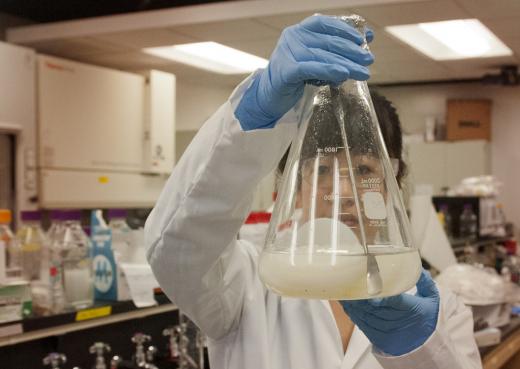For a century and a half, Penn State graduate students have played critical roles in research and discovery at the University.
Often, we are not aware of just how important these students are because they are often working behind the scenes, assisting with experiments in the laboratories, gathering data and writing research papers and reports.
But, if the image of Igor — and, for me, it’s Marty Feldman’s classic Igor in Young Frankenstein — hobbling around a dank basement lab full of bubbling cauldrons and neon green test tubes has suddenly entered your mind, let me dispel that notion.
Penn State graduate students aren’t just assistants, they often take the lead or play key roles in research that has the potential to dramatically improve our lives. These student researchers work in every field, from agriculture to medicine and from geology to astrophysics.
I’d like to point out just a few of the recent research stories that feature graduate students who were either the lead author of, or played an important part in the studies.
Games lead to spontaneous leadership
Tamara Peyton, doctoral student in information sciences and technology, investigated how leadership arises in games. In fact, Peyton and her colleagues found that video game and augmented-reality game players seemed to spontaneously build virtual teams and leadership structures without special tools or guidance.
Interestingly, even though the players in an augmented reality gamed called I Love Bees weren’t in the military, they quickly adopted a military-like leadership structure and used a lot of the language used by the U.S. military. Peyton presented a paper at the 2013 Annual Conference on Human Factors in Computing Systems in Paris on April 29. Judges awarded Peyton with a Best Paper Honorable Mention at the conference.
You can read more about the study by clicking HERE.
Talking tissue boxes and other smart objects
Sensors and computers are getting smaller, leading some experts to predict that one day, ordinary objects, like tissue boxes, will be able to communicate with us. But, will people find this cool or creepy? Haiyan Jia, doctoral candidate in mass communication is working with S. Shyam Sundar, Distinguished Professor of Communications and co-director of the Media Effects Research Laboratory. They study how people reacted to a talking tissue box compared to how they interacted with talking robots and other people.
The researchers found that people generally accepted the talking object, almost as much as a talking robot. This means that smart objects may have a place in our homes and offices and will pave the way for a web of intelligent and connected devices that experts are calling the Internet of Things.
Click HERE to read more.
Tapping the biofuel potential of plants
Plants are loaded with biofuel potential, but tapping into a plant cell’s tough, crystalline cellulose walls makes the biofuel-making process more difficult and more expensive.
Using bacteria that produce cellulose as a model to test the process Lin Fang, a graduate student in agricultural and biological engineering, and Jeffrey Catchmark, associate professor of agricultural and biological engineering, uncovered an approach to modifying cellulose synthesis in living plants for improved biofuel-making efficiency.
During the synthesis process the researchers added glucomannan, a complex carbohydrate found in plants that sticks to cellulose, and found that it altered the structure and assembly of the cellulose, allowing it to be broken down more efficiently.
The researchers plan to test the process in plants. By growing plants with cellulose that is less crystalized and that has fewer structured bundles, biofuel manufacturers will not need to spend as much time and effort breaking them down.
Click HERE to learn more.
Interested in finding out more about Penn State research? Subscribe to Penn State’s free weekly Research & Discovery newswire! http://www.rps.psu.edu/subscribe/sample.html Friend us on Facebook [http://www.facebook.com/pennstateresearch], follow us on Twitter [https://twitter.com/#!/pennstatersrch], or check out our blog, Penn State Research Matters [link: http://pennstateresearchmatters.wordpress.com/].



